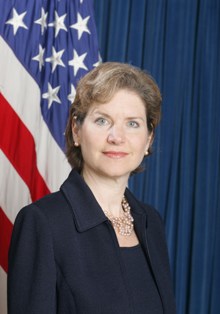Susan Schwab
| Susan Schwab | |
|---|---|
 |
|
| 15th United States Trade Representative | |
|
In office June 8, 2006 – January 20, 2009 |
|
| President | George W. Bush |
| Preceded by | Rob Portman |
| Succeeded by | Ron Kirk |
| Personal details | |
| Born |
March 23, 1955 Washington, D.C., U.S. |
| Political party | Republican |
| Education |
Williams College (BA) Stanford University (MA) George Washington University (PhD) |
Susan Carol Schwab (born March 23, 1955) is an American politician, who served as United States Trade Representative from June, 2006 to January, 2009.
She was nominated to replace Rob Portman as United States Trade Representative in April, 2006, becoming Acting Trade Representative upon Portman's confirmation as director of the Office of Management and Budget. Previously, she served as Deputy United States Trade Representative from 2005 to 2006.
Prior to becoming Deputy Trade Representative, she had served since 2003 as President and CEO of the University System of Maryland Foundation. From 1995 to 2003, she served as Dean of the School of Public Policy at the University of Maryland, College Park, where she remains on the faculty. Earlier in her career, she served as an aide to then-U.S. Senator John Danforth, as a foreign service officer in the State Department, as a well-respected Director-General of the Foreign and Commercial Service within the U.S. Department of Commerce, and as a business development executive at Motorola. Her first job was a trade negotiator with the USTR office, and she later served as Trade Policy Officer in the US Embassy in Tokyo.
She negotiated the United States-Canada softwood lumber dispute by signing a deal along with Canadian Trade Minister David Emerson on September 12, 2006 that gave Canada 4 out of the 5.3 billion dollars that the country lost in the dispute.
On January 13, 2009, as the Bush Administration neared its end, Schwab reportedly announced retaliatory tariffs on "dozens" of European luxury items, including French truffles, Irish oatmeal, Italian sparkling water and Roquefort cheese. The European ban on U.S. beef containing hormones was the reason cited by the US for the retaliatory action. Roquefort cheese, made from sheep's milk in a region of southern France, was hit with a 300% tariff, apparently the highest level by far of any in the package. When a 100% tariff was placed on the cheese in 1999, the report says, José Bové helped marshal opposition. As of 2009, the French complaint with the Roquefort tariff is being pursued through diplomatic channels. She helped to launch negotiations for ACTA.
...
Wikipedia
